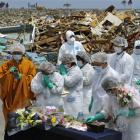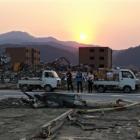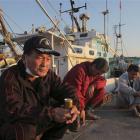Japan aims to restart two nuclear reactors at Kansai Electric Power Co's Ohi power plant around April, the Yomiuri newspaper reports, which would mark the first reactor restart since the Fukushima disaster almost a year ago.
A Japanese baby food manufacturer has announced the recall of 400,000 cans of infant formula which reportedly contain traces of radioactive cesium connected to the nation's recent nuclear plant meltdown.
The operator of Japan's damaged Fukushima Dai-ichi nuclear power plant is building a huge tent to cover one of the worst-hit reactors.
Donning white protective suits, neighbours of Japan's radiation-leaking nuclear plant have returned home for the first time since March the crisis began.
A major international mission to investigate Japan's flooded, radiation-leaking nuclear complex began as new information suggested that nuclear fuel had mostly melted in two more reactors in the early days after the March 11 tsunami.
Japan raised the severity level of the crisis at its crippled nuclear plant Tuesday to rank it on par with the 1986 Chernobyl disaster, citing cumulative radiation leaks that have contaminated the air, tap water, vegetables and seawater.
Japan has declared a 20km evacuation zone around its tsunami-crippled nuclear power plant a no-go zone, urging residents to abide by the order for the sake of their own safety.
The spectre of a worsening nuclear accident hangs over one of Tokyo's favourite holiday destinations. Peter Dowden, who worked in the Fukushima tourism industry in the late 1990s, describes the alpine thermal wonderland that is at stake.
Dunedin expat Mike Harris lives in the town of Minakami, in Gunma prefecture, where he runs a canyoning business: thrill seekers can shoot rapids in wetsuits and helmets or by raft or kayak, as well as abseil the local crags
Japan's government has ordered the operator of a tsunami-damaged nuclear plant leaking radiation to pay about $NZ15,000 to each household forced to evacuate from the area.
Japan ranked its nuclear crisis at the highest possible severity on an international scale - the same level as the 1986 Chernobyl disaster - even as it insisted that radiation leaks are declining at its tsunami-crippled nuclear plant.
Music concerts in Queenstown in aid of earthquake and tsunami-battered Japan raised more than $4000 for New Zealand Red Cross and Salvation Army appeals.
Crews are packing a 86,183kg truck on to a cargo plane so it can fly to Japan and pour water on to damaged nuclear reactors that are spewing radiation.
A strong aftershock ripped through northeastern Japan, killing two, injuring dozens and piling misery on a region still buried under the rubble of last month's devastating tsunami.
Modern sea walls failed to protect coastal towns from Japan's destructive tsunami last month. But in the hamlet of Aneyoshi, a single centuries-old tablet saved the day.
Workers at Japan's tsunami-damaged nuclear power plant have finally stemmed a tide of radiation that was pouring into the Pacific and exacerbating concerns over the safety of seafood.
Southern log and lumber exporters can expect increased orders from Japan once a rebuilding plan gets under way - further boosting the sector's recent recovery.
University of Otago Japan Club members are working hard to raise funds in support of two Red Cross appeals in the aftermath of recent earthquakes in Christchurch and Japan.
Japan is increasingly turning to other countries for help as it struggles to stabilise its tsunami-stricken nuclear plant and stop radiation leaks that are complicating efforts to recover the bodies of some of the thousands swept away by the towering wave.
New readings show radiation levels continue to rise in the ocean outside a leaking nuclear plant in Japan's northeast, officials said today, as they debated whether to broaden the evacuation zone around the tsunami-damaged facility.











